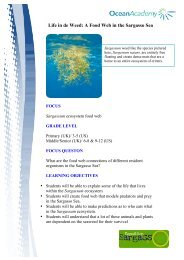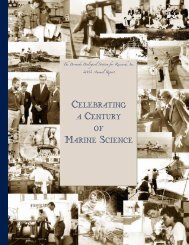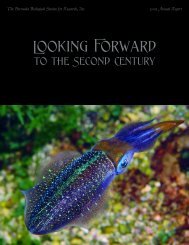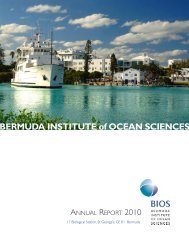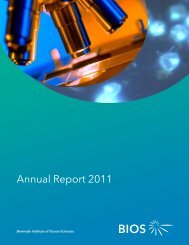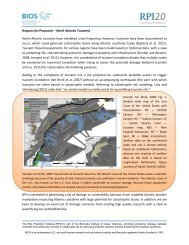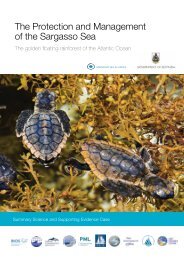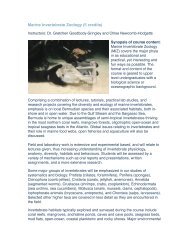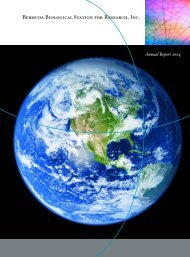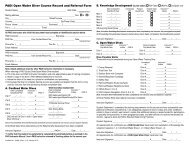Evaluating<strong>Bermuda</strong>’sNo-take Zones<strong>2001</strong> marked <strong>BBSR</strong>’s 99 th year <strong>of</strong> investigating <strong>Bermuda</strong>'s ocean,making it one <strong>of</strong> the most thoroughly studied marine environmentsin the world. Building on the foundation laid by generations <strong>of</strong>scientists since <strong>BBSR</strong>'s founding in 1903, <strong>BBSR</strong>’s present facultymembers are working together to examine a range <strong>of</strong> importantissues for <strong>Bermuda</strong>'s environment.For example, Dr. Kent Simmonsfocuses on <strong>Bermuda</strong>’s air and waterquality. Dr. Richard Owen studiesmarine pollution threats (see page 6).Dr. Samia Sarkis leads an effort tobring back <strong>Bermuda</strong>’s endangeredscallop population. And Dr. KathyCoates examines <strong>Bermuda</strong>’s marinebiological diversity.Postdoctoral fellow Dr. ShanePaterson, a new addition to <strong>BBSR</strong> in<strong>2001</strong>, describes here a collaborativeeffort with <strong>BBSR</strong> Assistant ResearchScientist Dr. Robbie Smith, who leads<strong>BBSR</strong>’s coral reef research team, andpostdoctoral fellow Dr. Joanna Pitt.ANEW <strong>BBSR</strong> PROJECT, funded byThe Pew Charitable Trusts andthe Curtis and Edith MunsonFoundation, assesses the impact <strong>of</strong>efforts to protect <strong>Bermuda</strong>’s coral reeffisheries resources. Because <strong>of</strong> the datacollected over close to a century at<strong>BBSR</strong>, and because <strong>of</strong> <strong>Bermuda</strong>’shistory <strong>of</strong> environmental protection,this case study may prove to be avaluable model for other island nationsstruggling with declining fisheries.<strong>Bermuda</strong>’s long history <strong>of</strong>environmental protection dates back tothe remarkably prescient 1620protection <strong>of</strong> young sea turtles. A littlemore recently, beginning in the 1970s,<strong>Bermuda</strong>’s government began toaddress concerns regarding the decline<strong>of</strong> its fisheries resources and createdthree seasonally protected and 29permanently protected fisheriesreserves, or no-take zones, withinwhich extractive activity is notpermitted. In 1990, the governmenttook the further step <strong>of</strong> banningcommercial fish traps, a controversialmove that has since been adopted bysome Caribbean nations.<strong>Bermuda</strong>’s fisheries resources havehad a history <strong>of</strong> overexploitation –perhaps not as catastrophic and suddenas that faced by many other nations,but overfishing, nonetheless. Divers on<strong>Bermuda</strong>’s reefs are unlikely to seemuch in the way <strong>of</strong> predatory fishes.The Nassau grouper, a predator <strong>of</strong> greatecological and fisheries importance, iscommercially extinct in Bermudianwaters. This scarcity <strong>of</strong> predatory fishesis <strong>of</strong>ten an indicator that all is not well,
if only because predators are preferentially targeted byfishermen and are typically the first removed by overfishing.With the abolition <strong>of</strong> fish traps and a generally greaterawareness <strong>of</strong> the consequences <strong>of</strong> overfishing, <strong>Bermuda</strong>’s reeffisheries now have a good chance <strong>of</strong> slowly restoringthemselves.The central goal <strong>of</strong> <strong>BBSR</strong>’s study <strong>of</strong> Bermudian no-takezones is to determine the effectiveness <strong>of</strong> existing reserves,with a secondary goal <strong>of</strong> making recommendations that mightenhance such reserves. Such improvements, if any arenecessary, might include changes inthe delineation <strong>of</strong> current no-takezones or perhaps more subtle shifts intheir management. <strong>Bermuda</strong>’ssituation provides us an opportunityto examine effectiveness <strong>of</strong> no-takezones both on the basis <strong>of</strong> their sizeand their age. For example, we mightexpect to see greater abundance,biomass and diversity <strong>of</strong> fishes inolder no-take zones than in newerones and in larger no-take zones thanin smaller ones.Siting and sizing <strong>of</strong> these marineprotected areas (MPAs) is far from astraightforward process. The 19 newno-take zones around <strong>Bermuda</strong> aresmall, located around the outer rim <strong>of</strong> <strong>Bermuda</strong>’s reef platform,and designed primarily to encompass popular dive sites.Almost all are centered around shipwrecks. Whether theseunits <strong>of</strong> <strong>Bermuda</strong>’s no-take network are really effective inpreserving, replenishing and exporting stocks <strong>of</strong> reef fishes arequestions <strong>BBSR</strong> scientists are addressing. Do they protecthabitats inappropriate to the network’s stated goals <strong>of</strong> buildingand sustaining healthy reef-fish stocks? Are the sites in greatestneed <strong>of</strong> protection those at which diving is infrequent and forwhich protection has therefore not been considered? Are theno-take zones too small?Our overall design focuses on comparing survey siteswithin no-take zones with those outside the no-take zones buton otherwise similar areas <strong>of</strong> reef in the same general location.With the abolition <strong>of</strong> fishtraps and a generally greaterawareness <strong>of</strong> the consequences<strong>of</strong> overfishing, <strong>Bermuda</strong>'s reeffisheries now have a goodchance <strong>of</strong> slowly restoringthemselves.In <strong>2001</strong>, our effort was channeled mainly toward surveyingsites selected from among the ten original no-take zones andtheir adjacent control sites. In 2002, we will begin adding thenew reserves, now two years old.The two years over which <strong>BBSR</strong>’s MPA project currentlyruns will yield essential data and give us an idea <strong>of</strong> what ishappening within, among and outside <strong>Bermuda</strong>’s fisheriesreserves. Ultimately, though, this study is not a quick and easyone. It may take many years for overfished areas <strong>of</strong> the<strong>Bermuda</strong> reef platform to show obvious signs <strong>of</strong> recovery. It iscritical that monitoring continuesover years and decades once thecurrent baseline has beenestablished. Such a database is aninvaluable tool to local fisheriesmanagers; in fact, monitoring is one<strong>of</strong> the most important components inmanaging marine parks.The results <strong>of</strong> the study are notconfined to merely laying thisbaseline for future work, nor evensolely to informing policy within<strong>Bermuda</strong> that could have real andbeneficial repercussions for thecountry’s marine resources. Theimplementation <strong>of</strong> this surveyprogram has also laid thegroundwork for expanding <strong>BBSR</strong>’s participation in reef fishecology and fisheries-related research worldwide. Naturalextensions <strong>of</strong> this program will include a project that focuseson assessing and bolstering <strong>Bermuda</strong>’s threatened grouperfisheries resources.Further, studies conducted in <strong>Bermuda</strong> have the potentialto benefit other countries that may be quite disparate and farflung,just as work conducted in the Philippines, on the GreatBarrier Reef and elsewhere has contributed to the backgroundagainst which this project was conceived and has evolved. Thiscentral fact handily illustrates the pr<strong>of</strong>ound interdependence<strong>of</strong> the world’s natural and human communities, which itselfmirrors the connectivity that makes coral reefs suchremarkable systems.Top left: The spotfin butterfly fish (top), hog fish (center left) and queen parrot fish (center right) are vital parts <strong>of</strong> <strong>Bermuda</strong>’s fragilereef ecosystem. The predatory black grouper (bottom) is now a rare sight on <strong>Bermuda</strong>’s reefs.Center left: A map <strong>of</strong> the <strong>Bermuda</strong> platform showing <strong>Bermuda</strong>’s marine protected areas and <strong>BBSR</strong>’s study sites (from a mapproduced by the <strong>Bermuda</strong> Government)Lower left: Postdoctoral fellows Joanna Pitt (left) and Shane Paterson (center), and Assistant Research Scientist Dr. Robbie Smithdiscuss reef monitoring sites in the Benthic Ecology Research Program lab.5



